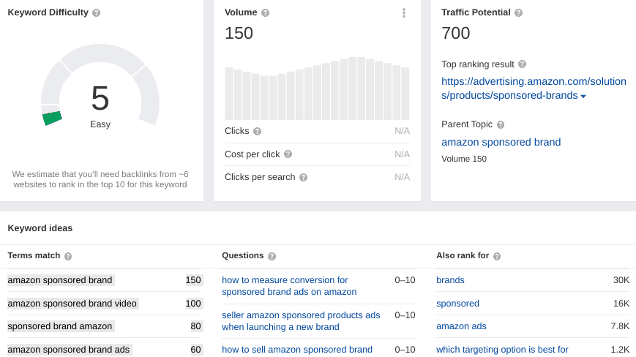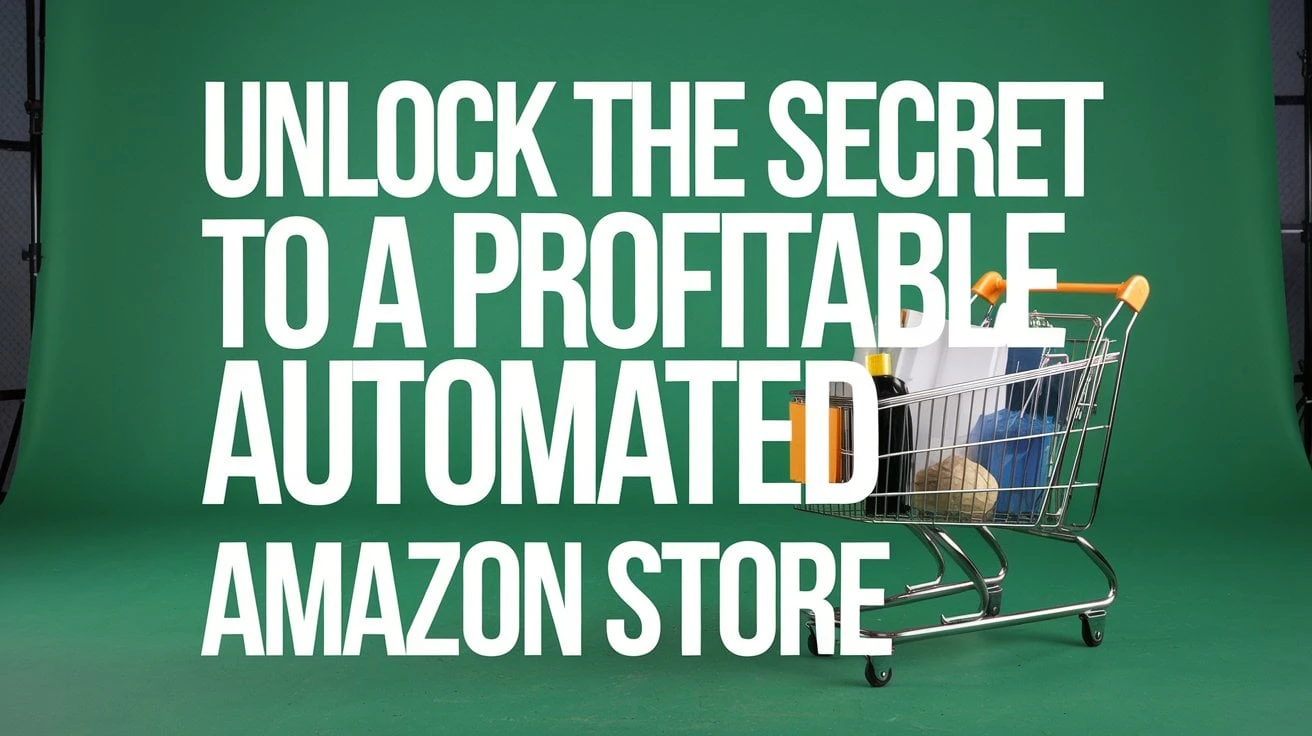What you’ll learn
Are you looking to excel in the world of FBA? You’re not alone. Every day, more and more entrepreneurs are turning to Amazon’s fulfillment services for their businesses.
Unfortunately, it can be difficult to stand out from the competition. If you want to ensure success with your FBA business, one key factor is understanding how to use hidden keyword opportunities.
In this article, we’ll explore hidden keyword opportunities and why they are so crucial for a successful FBA business.
We’ll show you exactly how to take advantage of these hidden gems that will give your product listings an edge over the rest and help ensure your products get noticed by Amazon shoppers.
So if you’re ready to start taking advantage of every opportunity available in the world of FBA, read on! Discovering these hidden keyword opportunities could be just what your business needs to stay ahead of the game.
To succeed in today’s e-commerce marketplaces, you must know all the hidden keyword opportunities available to help boost your ranking positions and increase search volume for relevant keywords.
Knowing how to utilize these tools properly can give you an edge over competitors and ensure your product pages stay at the top of customer searches.
The key is to find words related to your product that isn’t being used frequently yet still provide a high level of relevance for potential buyers.
This means researching competitor websites, social media content, and other sources outside of traditional SEO methods like Google Ads or Bing Ads.
Benefits Of Using Keywords

Using keywords in your SEO strategy is essential if you truly want to get ahead of the FBA game. You can uncover hidden keyword opportunities that competitors may have overlooked through keyword research and monthly search volume analysis.
Taking advantage of these untapped resources will help boost your ranking on SERPs and give you a noticeable edge in the industry.
With the right tools, like Google Adwords or SEMrush, identifying potential new keywords has never been easier. You’ll be able to quickly analyze which words are most popular among consumers and use them strategically for increased visibility in online searches.
Not only does this give you an advantage over other sellers, but it also allows you to craft content with more precision and relevance than ever before.
By leveraging keyword opportunity through comprehensive SEO tools, you can gain insights into consumer behavior and optimize your content accordingly – giving yourself a better chance at success as an FBA seller.
Search Engine Optimization (SEO) Strategies
Uncovering hidden keyword opportunities in the FBA game is essential for any e-commerce business. To get ahead, it’s important to employ strategic Search Engine Optimization (SEO) techniques that will help boost visibility and bring more organic traffic to your site.
The first step involves researching relevant keywords related to your products or services. You can do this by exploring search engine results pages and looking at what phrases appear most often on the top-ranked sites.
Once you’ve identified a few potential target keywords, plug them into a keyword column of your own domain and take note of the estimated monthly traffic numbers associated with each one.
This information will be helpful when creating content tailored toward those specific terms.
In addition to employing SEO tactics within your website, you should also look at implementing external link-building strategies like guest blogging or optimizing social media profiles; these activities are known to increase referral traffic as well as establish authority and trust among customers.
All of these combined efforts should give your online presence an edge over competitors and ensure shoppers find exactly what they’re looking for when searching on Google or other major search engines.
Understanding Your Audience

Successful FBA businesses understand their audiences, and knowing who you’re targeting and what they want is key to getting ahead of the game. To stay competitive, you must regularly monitor your search terms, related terms, current rank, and branded terms.
Tracking changes in consumer behavior across different platforms – such as Google Ads or Amazon PPC – it can provide insight into where there may be potential gaps in the market that you could fill with effective keyword strategies.
By leveraging data analytics tools like SEMrush or Ahrefs, we can identify new keywords and phrases which are relevant to your target audience and have low competition but high organic traffic potential.
This will ensure you remain visible online when consumers are looking for products similar to yours. With an understanding of how customers search for products comes the ability to optimize your campaigns accordingly and maximize return on investment (ROI).
Through researching competitor activity, analyzing historical performance trends, and testing various tactics over time, we can develop an SEO strategy that will increase visibility and give you a distinct advantage over rivals in the FBA space.
How To Find Profitable Keywords On Amazon?
Now that you understand your audience, let’s look at the hidden keyword opportunities to get ahead of the FBA game. You can use search engines and Google Search Console to uncover potential keywords for your Amazon products.
Look beyond obvious terms related to your product – instead, focus on similar keywords or ‘long tail’ phrases. These will often be more profitable in the long run as they are less competitive and have a better chance of ranking much higher in searches without breaking the bank on ad spend.
It’s important to do extensive research when it comes to choosing keywords for your Amazon products.
🗣️ Pro Tip: Using specialized keyword planning tools can help significantly reduce research time.
Utilizing tools such as keyword planners, brainstorming sessions with other professionals, digging into competitor data, and researching customer feedback may help you discover new words and phrases that could give you an edge over others selling similar items.
Additionally, using analytics software like Alexa can provide insight into which words customers are using when searching for items, so you know exactly what terms to target with your campaigns.
Identifying Your Market Niche & Analyzing Competitors
When aiming to get ahead of the FBA game, it is important that you identify your market niche and analyze competitors in order to maximize success. To do this effectively, there are three key steps:
- Research Your Domain Authority – You need to understand how authoritative your domain is compared to competing domains. This can be done by looking at the following metrics:
- Number of backlinks from reputable sources
- Quality of content on the website
- Volume and quality of indexed pages
- Social media presence
- Website accessibility & usability
- Analyze Competitors – Evaluate what keywords they use, their product offerings, pricing strategy, etc. Make sure you consider any changes made over time to avoid falling behind.
- Also, make sure to note any differences between them and yourself – such as different target markets or lower prices than yours – that might impact your performance in the long run.
- Find The Right Keywords – Use fat head terms for broad topics related to a particular keyword phrase. Then look for mid-tail terms which have more specific words associated with them but are still relevant enough for search engine optimization (SEO) purposes.
- Finally, include long-tail phrases which are extremely targeted towards a certain audience or topic area.
- By understanding each level and its relevance concerning one another, you will gain insight into how search engine algorithms work and prioritize results based on user queries.
Once you’ve identified these areas, create a comprehensive plan accordingly tailored around finding the right keywords, analyzing competitors, and improving your domain authority to outperform other sellers in this competitive arena.
Doing so will give you an edge over others when it comes to succeeding in eCommerce business ventures like Amazon FBA!
Optimizing Product Descriptions And Titles
Optimizing your product descriptions and titles is a key part of any successful Amazon FBA business. By creating SEO-friendly content, you can ensure that your products appear in the top search engine results when customers look for items to purchase.
This will help drive more traffic to your store and increase sales.
When it comes to selecting good keywords for your product descriptions and titles, there are several factors to consider.
First, think about how much traffic each keyword would generate if used in a title or description; this will give you an idea of which ones have the potential to be most effective.
Additionally, research competitors’ products to see what kind of words they use in their own descriptions so you can get ideas on what terms might work best for yours as well.
Finally, try out different combinations of words until you find one that resonates with shoppers and helps boost visibility on search engines.
By utilizing some proven SEO strategies, such as optimizing product descriptions and titles with targeted keywords, you can ensure that your store stands out from the competition and increases its online visibility.
Which Tool Is The Best For Amazon Keyword Research?
Choosing the right tool for Amazon keyword research can be like navigating a minefield: one misstep, and you could potentially find yourself in hot water.
Finding the best keywords to help you get more traffic is critical. That’s why I’m going to reveal some of my top tips for choosing the perfect tool for your needs:
- Estimate Traffic – Look for tools that allow you to estimate how much traffic each given keyword will bring. This helps you identify which ones are worth pursuing further.
- Check Current Rankings – It’s important to know where your keywords are currently ranking so that you can determine whether or not they’re worth targeting again. You’ll also want to look at their competition levels to see if there’s any room for improvement.
- Analyze Competitors’ Performance – Many keyword research tools offer features that let you analyze the performance of your competitors’ keywords as well. This gives you valuable insight into what strategies they may be using and how successful they are with them.
- Identify Long-Tail Opportunities – Finally, ensure that your chosen tool allows you to identify long-tail opportunities. These types of keywords tend to have less competition but still provide great potential for getting more traffic from search engines.
Using these criteria, it shouldn’t take long before you find the perfect tool for your Amazon keyword research needs! With just a tiny bit of effort, you can start driving more organic traffic quickly and easily – all while staying ahead of the FBA game.
Measuring And Tracking Performance Metrics
Measuring and tracking performance metrics is essential for any FBA business. By understanding all the data, you’ll be able to identify what’s working and what isn’t – allowing you to make better decisions about your existing content and strategies.
To get ahead of the game, it’s important that you measure the impact of your top pages regularly. This will help you improve those pages with optimized keywords to maximize their potential for better results.
Plus, by analyzing page performance on a regular basis, you can quickly spot new opportunities or changes in search trends that could lead to higher rankings.
🗣️ Pro Tip: Remember, what you can measure, you can improve.
Understanding Searcher Intent
It’s time to move beyond performance metrics and dive into the next level of SEO success: understanding searcher intent.
Like a puzzle, it takes pieces from all areas to get the full picture – including keyword research, user experience design, content optimization, and testing & tracking.
Knowing what your potential customers are looking for will not only increase traffic but also boost conversion rates.
When you’re prepared to take control of your SEO strategy, getting ahead of the FBA game by uncovering hidden keyword opportunities is key. To do this effectively, you must understand how people search online and what their ultimate objectives are with that query.
This requires diving deep into trends in analytics data and studying consumer behavior patterns through various channels such as social media forums or surveys.
By recognizing these patterns, you can create content tailored to those needs while ensuring that each piece contains keywords relevant to them, providing an additional source of traffic.
The goal here isn’t just to drive more visitors to your website; it’s also about making sure they stay there long enough to convert at a fair rate.
Taking advantage of hidden keyword opportunities allows you to reach out directly to those who would be interested in buying from you – resulting in higher conversions than ever before!
Adjusting Strategies For Maximum Impact
Understanding hidden keyword opportunities is a great way to start if you’re looking to get ahead of the FBA game. To maximize your impact and visibility on Amazon, following these strategies will help increase your reach:
- Utilize keywords within product titles.
- Optimize images with relevant tags and descriptions.
- Leverage customer reviews for additional insight into trending topics and sales opportunities.
- Monitor competitors that are ranking well in search results for popular terms associated with products or services similar to yours.
You can stay a couple of steps ahead of the competition in Amazon’s marketplace by keeping an eye out for new trends, adjusting your strategy accordingly, and consistently monitoring performance metrics.
This includes optimizing content regularly (as often as possible), taking advantage of seasonal marketing tactics, and using analytics data to guide decisions about what changes to make when needed.
With some patience, determination, and a smart approach, you can outperform competing businesses quickly!
Final Words
Optimizing your product listings with the right keywords ensures you get ahead of the FBA game. With an understanding of who your audience is and their intent when searching for products, it’s now time to start finding profitable keywords on Amazon.
The best tool to use for keyword research would be one that provides detailed metrics and search results to help you measure performance.
Once you’ve identified the most effective keywords, use them in combination with other elements, such as titles, descriptions, bullet points, and images, to create compelling content.
Measure and track performance regularly so that you can adjust strategies for maximum impact – this will increase visibility and engagement rates. Finally, remember that staying up-to-date on trends related to FBA and using creative approaches are key components for success!
Comments
Related Posts

10 Profitable Product Categories for Amazon Affiliates 2025
What you’ll learn Amazon is a favorite for experienced and…

Unlock the Secret to a Profitable Automated Amazon Store: How to Build a Hands-Free Income Stream
Ever dreamed of running a profitable Amazon business while sipping…

Master Amazon New Restricted Keywords: A Seller’s Guide to Success
Changes to Amazon’s restricted keywords list have taken a lot…







Leave a Reply